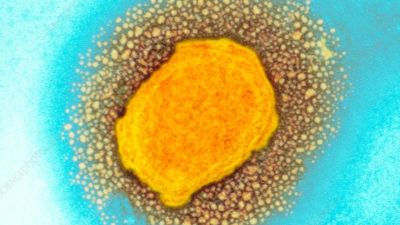Monkeypox: Gay and bisexual men at higher risk of exposure to be offered vaccines

Who will the monkeypox vaccine be offered to and how effective is it? ITV News Health Editor Emily Morgan reports
A monkeypox vaccine will be offered more widely to gay and bisexual men in a bid to help control outbreaks, says the UK Health Security Agency (UKHSA).
Although anyone can contract monkeypox, data collected by the agency suggests higher levels of transmission within sexually active gay and bisexual men.
The virus is not currently defined as a sexually transmitted infection, but can be passed on by close and intimate contact that occurs during sex.
Smallpox vaccines such as Imvanex are being touted as an effective way of protecting against monkeypox.
As of June 20, there were 793 confirmed cases of monkeypox in the UK, with 766 being traced in England, 18 in Scotland, three in Northern Ireland and six in Wales.
NHS England will be setting out details on how eligible people can get vaccinated shortly, however they have advised that people shouldn't come forward for vaccinations until they have been contacted.
The eligibility of individuals would depend on a number of factors, but the criteria would be similar to those used to asses eligibility for HIV pre-exposure treatments.
Dr Mary Ramsay, UKHSA head of immunisation, said: "Our extensive contact tracing work has helped to limit the spread of the monkeypox virus, but we are continuing to see a notable proportion of cases in gay, bisexual and other men who have sex with men.
"By expanding the vaccine offer to those at higher risk, we hope to break chains of transmission and help contain the outbreak."
While most cases of are mild, severe illness can occur in some people, leading the health organisation to offer out vaccines in line with growing outbreaks.
What are the symptoms?
It usually takes between five and 21 days for the first symptoms of the infection to appear.
The first symptoms of monkeypox include:
a high temperature
a headache
muscle aches
backache
swollen glands
shivering (chills)
exhaustion
A rash, which often begins on the face before spreading, usually appears one to five days after the first symptoms.
Dr Ramsay added: "The NHS will soon set out details on how this will be delivered – so do not come forward for the vaccine yet.
"In the meantime, everyone should continue to be alert to any new spots, ulcers or blisters on any part of their body, particularly if they’ve had close contact with a new partner.
"If you think you have these symptoms, avoid close contact with others and call NHS 111 or your local sexual health centre, though please phone ahead before attending."
Alex Sparrowhawk, Health Promotion Specialist at Terrence Higgins Trust, added: "This targeted vaccination programme is a positive move forward while the data still shows monkeypox is disproportionately affecting gay and bisexual men in the UK.
"We encourage everyone, regardless of their sexuality, to be vigilant about new spots, ulcers and blisters.
"We are continuing to closely monitor the latest data in order to play our part in providing the latest guidance and health information on monkeypox, to empower the communities most affected to best protect their health."
Want a quick and expert briefing on the biggest news stories? Listen to our latest podcasts to find out What You Need To Know